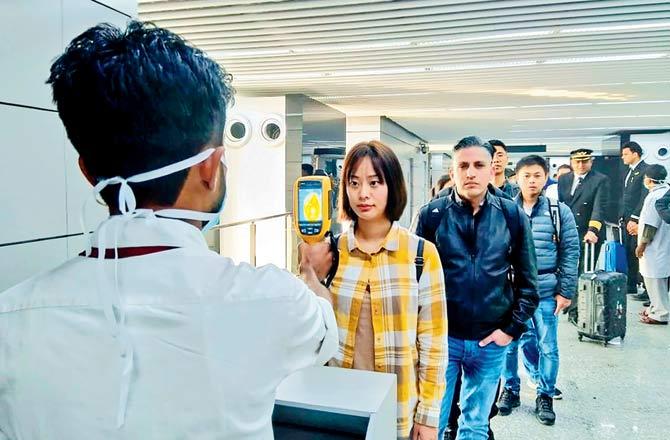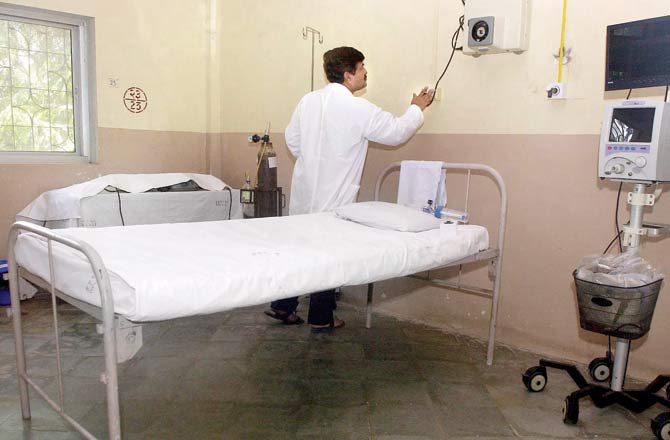As deadly virus spreads across the world, doctors warn that the city lacks infectious diseases specialists, isolation wards, and the capability to construct a new hospital within days; worse, just 52 beds have been set aside for quarantine

The isolation ward in Kasturba Hospital. File pic
With the novel Coronavirus COVID-19 impacting people globally, Mumbai has a mere 32 beds reserved for quarantine patients in Kasturba Hospital and 20 beds in the trauma hospital in Jogeshwari East. Experts say that the city is lacking badly in medical preparedness. Dr Wiqar Shaikh, a senior physician and allergy specialist, said, "We have a genuine problem at hand. If there is a massive outbreak of COVID-19 in India, the fact is that we are not prepared to tackle it, because we have a lot of issues with our existing medical infrastructure."
There are no infectious diseases specialists, infectious diseases wards or isolation wards in any of our medical colleges and hospitals. Moreover, does India have the capability to construct a new hospital in ten days, as China did? This is a serious concern," Dr Shaikh said.
ADVERTISEMENT

Passengers arriving from China and Hong Kong are screened for Coronavirus at Kolkata-s Netaji Subhash Chandra Bose International Airport. Pic/AFP
He added that tackling emergencies will be a mammoth task and there will be a high risk of infection and mortality. "This is a serious lacuna which needs to be corrected at the earliest. We don-t even have training programmes for infectious diseases like we do for other specialties. For example, in case of allergy, experts take special training from international institutions to treat allergies," Dr Shaikh said.
General consensus among experts is that there is no scientific evidence to prove that only symptomatic individuals are spreading the virus.

Experts say low number of quarantine facilities in city is matter of concern. File pic
"We have more unanswered questions to tackle before we get into the debate on preparedness. The three positive cases in Kerala were tackled well as everyone who came in contact with suspected patients was quarantined and the district hospitals had full-fledged isolation wards and trained staff. But an outbreak in Mumbai, Delhi, Kolkata and Bengaluru will be a challenge," said an expert on condition of anonymity.
Can COVID-19 spread sexually?
Questions like the presence of COVID-19 virus in male genitalia, chances of it spreading through sexually active infected men, through sweat or tears of infected people, are being raised in the science community.
Is one negative throat swab good enough? The question over an asymptomatic person shedding the virus for weeks does not have answers. Another matter — which needs scientific verification — of concern is people-s travel history playing a role in spreading the virus.
"We are not even going through basic infection-control practice, training for which should be a continuous process. We have studied six traces of COVID-19 and the latest one is the seventh trace, which became known to the world only after the outbreak in China," an expert added.
The Chinese doctor, Li Wenliang, who first raised an alert about COVID-19 in December and was killed by the virus a few weeks ago, had tested negative for the virus six times.
"People would not voluntarily admit having come in contact with infected people or visiting affected countries. Chances of the virus being misdiagnosed by general practitioners would be high, as they may treat the patient for the common flu," an expert said.
-Virus may die by March-end-
Traces of COVID-19 on things such as armrests, doorknobs, lift buttons, cutlery items can remain viable for spreading for over 150 hours. Experts don-t know if these things are being looked into.
Dr Om Shrivastava, an infectious disease expert at Jaslok hospital, said, "We presume that by end of March, when temperatures and humidity rise, the virus will die. But we will have to be watchful as these situations are projections based on current data."
Dilip Mehta, President of the Pharmaceutical Wholesale Association told mid-day that the government has restricted the import of medical and surgical equipment from China. A lot of it is procured by hospitals as it is cheaper. Though there is no system to screen these products for COVID-19 traces, hospitals must sterilise equipment.
"The daily production capacity for surgical masks is 20 lakh, while exporters are demanding two crore surgical masks per day. Enquiries are coming from Syria, UK, Thailand, Singapore, Honk Kong, Iran, etc. Export has been restricted to help tackle a potential outbreak in India," Mehta said.
Currently, infrared thermometers are being imported from South Korea. "But since South Korea is also facing an outbreak, import restrictions will follow," Mehta said.
-20 beds on standby in Jogeshwari-
Dr Padmaja Keskar, BMC-s Executive Health Officer said apart from the 32-bed quarantine facility at Kasturba Hospital, 20 beds are on standby at the Hindu Hruday Samrat Balasaheb Thackerey Trauma Care Municipal Hospital in Jogeshwari. "There have been over 10 suspected cases at Kasturba Hospital. All tested negative and were discharged," Keskar said. "Health officials are also calling people to enquire about patients with symptoms of viral infection," Keskar added.
Professor G M Nair, coordinator for the Institute of Advanced Virology at Thiruvanantapuram, Kerala, said, "Kerala has witnessed many outbreaks, the most recent one being the Nipah virus with a nearly 63 per cent mortality rate. Out of the 20 who tested positive, 17 died. In China, the number of affected people is 80,000 and deaths were around 2,900 which a mortality rate of less than 2.5 per cent. It could have been controlled had alarm bells rung earlier," Nair said.
The government-s Institute of Advanced Virology will begin in the next few months and the laboratory will be the first of its kind to carry out advanced research on the national and global impact of viral outbreaks.
20
No. of beds kept on standby to quarantine patients in Jogeshwari-s trauma hospital
150
No. of hours for which traces of COVID-19 can remain active and spread through touch
Catch up on all the latest Crime, National, International and Hatke news here. Also download the new mid-day Android and iOS apps to get latest updates
 Subscribe today by clicking the link and stay updated with the latest news!" Click here!
Subscribe today by clicking the link and stay updated with the latest news!" Click here!







